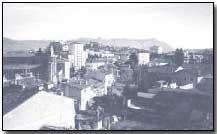Primary Documents - German Propaganda Order for use on the Italian Front, 1917
 Reproduced below is the
text of a German propaganda order from 1917.
Reproduced below is the
text of a German propaganda order from 1917.
Issued for use on the Italian Front, the document provided guidance and instructions for use when recruiting deserters from the Italian Army, and in the distribution of German propaganda to Italian soldiers situated in front-line trenches.
Tactics such as these were common among all armies during the war.
German Propaganda Order for use on the Italian Front, 1917
TWO HUNDRED AND EIGHTY-FIRST DIVISION, First Section, No. 226.
Confidential. Not to be communicated to troops in the first line.
First: Following the telephone order, Geroch No. 2,080, you are asked to intensify with efficacy the propaganda with the enemy army.
Second: The object of this propaganda is to disorganize the enemy army and to obtain information regarding it.
The propaganda must be carried out in the following manner: (a) By throwing into the enemy's trenches newspapers and proclamations destined for the more intelligent elements; (b) by persuading the troops by oral propaganda.
For that it will be necessary to utilize officers, under-officers, and soldiers who appear to be most adapted. The posts for making contacts with the enemy must be placed under the direction of the company commander, who must be in the first-line positions. These officers must ascertain the points where it will be the easiest to throw into the enemy trenches newspapers, proclamations, etc.
At these points you must seek to gain contact with the enemy by means of our interpreters, and if the enemy consents then fix an hour for future conversations. You must then advise immediately by telephone the chief of the Information Bureau of the division of every contact with the enemy.
Only the chief of the Information Bureau will have the right to direct the conversations according to the instructions he has received. It is rigorously prohibited for any of our soldiers to enter into relation with the enemy except those who have received the mission to do so, for fear that the enemy may seek to profit by their ingenuousness.
All letters and printed matter which the enemy may have on his person must be taken from him, and transmitted to the chief of the Information Bureau. Company commanders, above all, must seek to establish the points where the enemy's soldiers have received newspapers, the points where the newspapers were taken openly, and without precaution. There are posts of observation for the artillery, as it may happen that French officers or foreign army instructors are in these posts.
In these enterprises for obtaining contact with the enemy, success depends on the ability with which you operate. Good results can be obtained by calling in a friendly tone and indicating sentiments of comradeship or by reiterated promises not to fire and offers of tobacco. The tobacco for this purpose will be furnished by the company commanders.
Every evening, at 8 o'clock, the company commander must transmit directly to the information officer a report of the propaganda accomplished during the day. This report must contain the following indications:
(a) Has the enemy picked up our newspapers and proclamations?
(b) Have you endeavoured to enter into relations with the enemy?
(c) With whom have you had contact-officers, under-officers, soldiers?
(d) Where and when were our newspapers and proclamations thrown into the enemy's trenches?
(e) All other information of the enemy's conduct.
At the same time, our interpreters will send to the chief of the Information Bureau a detailed report on all conversations they have had with the enemy. The enemy's positions where propaganda is under way must not be shelled by our artillery; they must indicate to the batteries the positions of these points to be spared.
The enemy is perfidious and without honour, and it is necessary as a consequence to be careful that they neither take our propagandists prisoners nor kill them. Those of our soldiers who leave our lines for the purpose of carrying newspapers and pamphlets to the enemy must be advised.
To protect them it will be necessary to constitute with care special detachments, who will mount guard in the trenches, and who will fire only on the order of the company commander who is directing relations with the enemy.
Signed, on behalf of the temporary commander of the division, the Major General commanding the 62nd Brigade.
Source: Source Records of the Great War, Vol. V, ed. Charles F. Horne, National Alumni 1923
A howitzer is any short cannon that delivers its shells in a high trajectory. The word is derived from an old German word for "catapult".
- Did you know?
